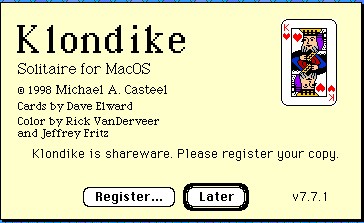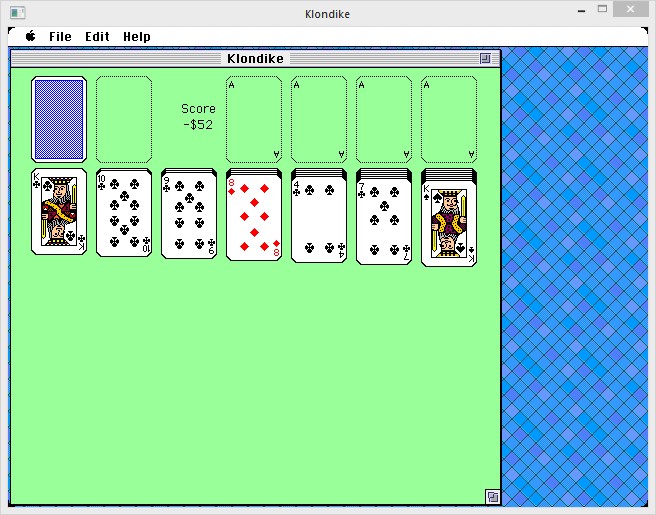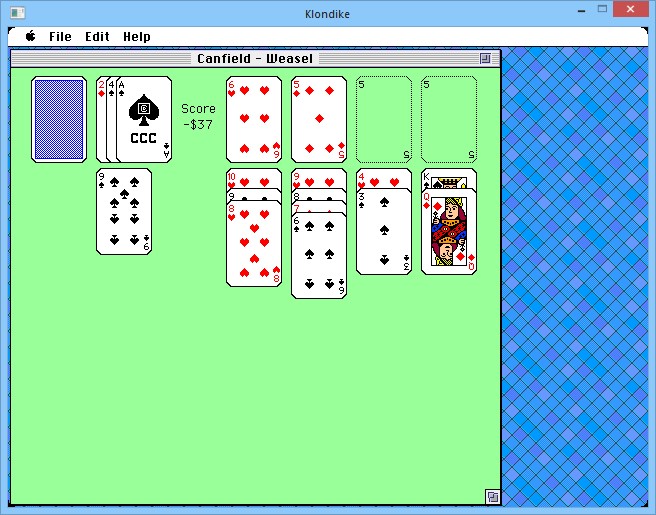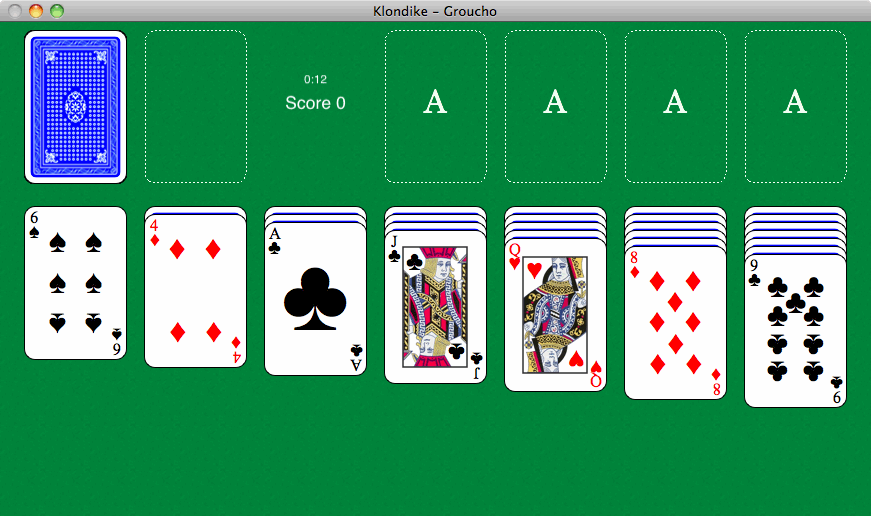
When I wrote of Windows Solitaire, I called it a computing revolution. That might be true of the "IBM and Compatible" marketplace, but it wasn't so true of the rest of the computing world. And while everybody's favorite bundled game certainly struck a chord with the popular PC, most people never knew of any computer games beforehand that played the same game in the same way. And while Klondike, developed by Michael A. Casteel for the original 128K Macintosh in 1984, was by no means the first computer solitaire game (Commodore Business Machines appear to have beaten him to the punch by about a year), it was most likely the first to use the now-familiar click-and-drag operations. And, similarly to the Windows game, it has one hell of a legacy.

Klondike, version 7.7.1, potentially the most compatible Macintosh game ever. (Shown running in, of all things, the Executor emulator under Windows 8.)
Admittedly, before setting out to write this article, I had never played Casteel's Klondike in any form. I only recalled reading about it in passing, during trips through websites dealing in Macintosh emulation. (Because once I'd experienced a Power Mac back in early 2000, I became almost obsessed with Mac shareware...but that's beyond the scope of this blog. I hope to write about them soon.) One website described Klondike as being almost more interesting for its place in history than as an actual game. Of course, they were comparing software from 1984 with the likes of Eric's Ultimate Solitaire, a much fancier-looking game with exponentially more options.
Why is Casteel's little shareware game so interesting, though? Because, despite being released for Macintosh, it was developed before the Macintosh launched. The very first entry in his version history is terse, but explains much:
Klondike 1.0 (1984)
--Version History, from the Klondike help file
- Developed on a borrowed Lisa using Lisa Pascal, Klondike was one of the first games available for the original Macintosh.
Before the Macintosh released, Apple had an "office system" called Lisa. It bore the earliest inklings of what would become the Macintosh System Software, to the point where applications developed for it could be readily adapted to the new Macintoshes without much effort. Curiously, Casteel's version history doesn't say much about the earliest days of Klondike, so I have no idea what trials he endured to get his software out there. But the man was a pioneer, to be sure.
The version history has no entries between 1984 and December of 1986, where the sole entry is "First version converted to Think Pascal on the Macintosh." The updates come somewhat faster afterwards; the same month, Golf Solitaire was released for black and white Macs. A little over a year later, Klondike gained support for the then-new Macintosh II line's new color displays. By the time the program gained an Undo button and full card dragging with 1989's 4.0 version, it was five years old. But Casteel wasn't done yet.

Klondike, running Canfield (added in April of 1998).
Following a three-year gap in the change log, Klondike 5.0 was released in 1992 to keep the program in line with Macintosh System 7.0, with support for the new Balloon Help system, among other things. By 1994, the program had gained improved shuffling algorithms and a new auto-move function. In 1998, it became native to PowerPC, though it still ran on older Macs with 68000-series processors.
By the time the Apple iMac launched in late 1998, Klondike was 15 years old and still releasing updates. Not just updates to modernize it for newer machines; updates that still ran on the oldest supported machines. Visually, the program still hadn't changed that much, still bearing the same cards (colorized since 1988) and only limited color options (the card back and background color could be changed, but that was about it), but since the beginning of 1998, it now contained 4 playable games (Klondike, Canfield, a Canfield variant called Racing Demons, and Golf). This was certainly not going to stack up against the myriad of solitaire competitors that had shown up since then (Eric's Ultimate Solitaire, Solitaire's Journey, and at least two Hoyle-branded games from Sierra), but this unassuming little shareware card game was still not going to give up.
As the Mac OS continued to grow, Casteel's game would continue to keep up with the changes. Klondike was "Carbonized" in October of 1999, offering an alternative build of the game for those Mac users who had made the upgrade to Mac OS X. Not long after, the Carbonized build was merged with the old one into a FAT Carbon app, enabling the same application to run on both the "classic" Mac OS and the brand new Mac OS X. It should be stressed that this version of the game still worked on pre-Mac OS 8.5 machines just as well as it did on the new OS X ones. Casteel's commitment to compatibility knew no bounds.

A modern version of Klondike for OS X. Nearly 40 years later and surprisingly little has changed.
The long hiatuses between updates were beginning to disappear. Casteel would push a new update every few months instead of every two years. He would only drop compatibility with an older Macintosh long after it had ceased being relevant; pre-8.5 systems were finally dropped in 2002 (Windows XP was out by then!). By now this simple little game of Klondike was no longer so simple; bug fix updates were becoming much more frequent than new features, not to say that new features weren't happening at all. FreeCell was the first game added since 1998 - it was finally added to the program in 2006. Only a few months later, support for Intel-based Macs was added by making Klondike a Universal Binary, still supporting Power Macs from almost 8 years before.
Fast-forwarding to the present day 2024, Michael Casteel is still maintaining Klondike. While, predictably, there came to be an iOS port (iKlondike) in 2009, both it and its equivalent Macintosh version continue to receive new updates. As of 2015, they are even cross-compatible with each other, allowing you to "Handoff" between them. In 2020, iKlondike now even runs natively on Apple Silicon, despite "only" requiring Mac OS X 10.14 or later - an OS revision that predates Apple Silicon by 2 years. They are still being sold, for $2.99 (for the iOS version) and $9.99 (for the Mac App Store version). Presumably, Casteel is still making money off them, and that should come to no surprise. Compared to the gigantic glut of "free" solitaire implementations that come with adware, in-app purchases, or pointless limitations; this Klondike that has been around for 40 years still has a lot to offer in not just simplicity, but reliability.